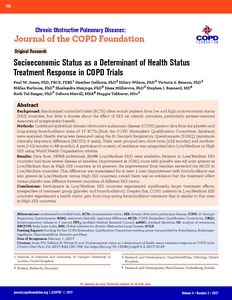Jones, PW;
Gelhorn, H;
Wilson, H;
Benson, VS;
Karlsson, N;
Menjoge, S;
Müllerova, H;
Rennard, SI;
Tal-Singer, R;
Merrill, D;
et al.
Jones, PW; Gelhorn, H; Wilson, H; Benson, VS; Karlsson, N; Menjoge, S; Müllerova, H; Rennard, SI; Tal-Singer, R; Merrill, D; Tabberer, M
(2017)
Socioeconomic Status as a Determinant of Health Status Treatment Response in COPD Trials.
Chronic Obstr Pulm Dis, 4 (2).
pp. 150-158.
ISSN 2372-952X
https://doi.org/10.15326/jcopdf.4.2.2017.0132
SGUL Authors: Jones, Paul Wyatt
![[img]](https://openaccess.sgul.ac.uk/109132/1.hassmallThumbnailVersion/JCOPDF-2017-0132-Jones3.pdf)  Preview |
|
PDF
Published Version
Available under License ["licenses_description_publisher" not defined].
Download (2MB)
| Preview
|
Abstract
Background: Randomized controlled trials (RCTs) often recruit patients from low and high socioeconomic status (SES) countries, but little is known about the effect of SES on clinical outcomes, particularly patient-centered measures of symptomatic benefit. Methods: Combined individual chronic obstructive pulmonary disease (COPD) patient data from the placebo and long-acting bronchodilator arms of 17 RCTs (from the COPD Biomarkers Qualification Consortium database) were analyzed. Health status was measured using the St George's Respiratory Questionnaire (SGRQ) (minimum clinically important difference [MCID]: 4 units). Trials were grouped into short-term (≤12 months) and medium-term (>12 months to 48 months). A participant's country of residence was categorized into Low/Medium or High SES using World Health Organization criteria. Results: Data from 19765 individuals (6109 Low/Medium SES) were available. Patients in Low/Medium SES countries had more severe disease at baseline. Improvement in SGRQ score with placebo was ≈2 units greater in Low/Medium than in High SES countries; at its greatest, the improvement from baseline exceeded the MCID in Low/Medium countries. This difference was maintained for at least 1 year. Improvement with bronchodilator was also greater in Low/Medium versus High SES countries; overall there was no evidence that the treatment effect versus placebo was different between countries of different SES status. Conclusions: Participants in Low/Medium SES countries experienced significantly larger treatment effects, irrespective of treatment group (placebo and bronchodilator). Despite this, COPD patients in Low/Medium SES countries experienced a health status gain from long-acting bronchodilator treatment that is similar to that seen in High SES countries.
Statistics
Item downloaded times since 14 Sep 2017.
Actions (login required)
 |
Edit Item |



